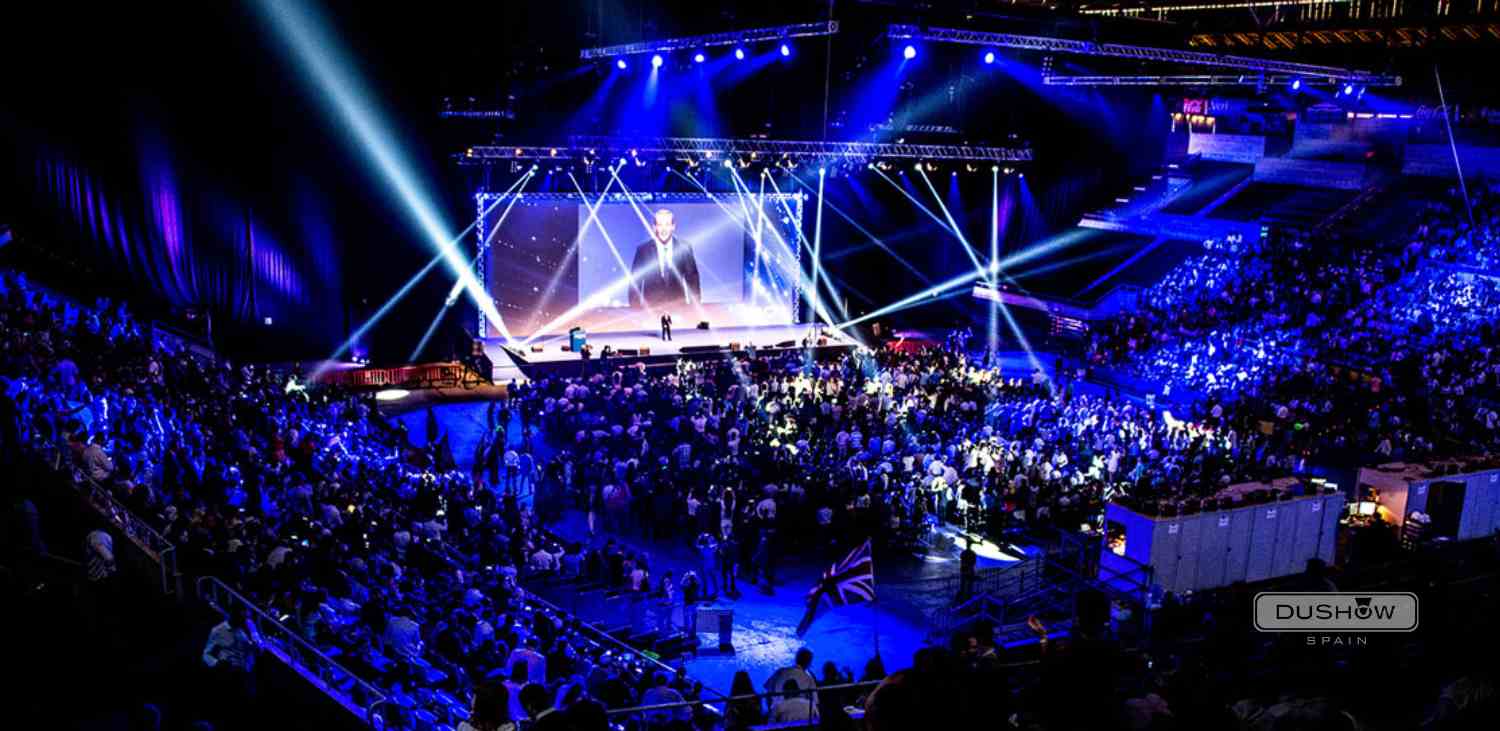Comprehending Event Production: Why It Is Necessary for Effective Events
Event production plays an essential duty in forming successful celebrations. It includes mindful preparation, sychronisation, and execution to guarantee every information straightens with the event's vision. This process not only enhances participant experiences yet likewise helps with significant connections among individuals. Comprehending the complexities of event production can greatly influence the total result. What are the crucial elements that add to an effective event, and how can they be successfully taken care of?
The Duty of Event Production in Producing Unforgettable Experiences
Many variables add to the success of an occasion, event production plays a pivotal function in crafting remarkable experiences. This multifaceted process encompasses different elements, including preparation, logistics, and execution. Efficient event production guarantees that every information aligns with the overall vision, developing a smooth circulation that astounds participants. By working with timelines, managing sources, and managing technological aspects, event manufacturers develop a foundation for impactful experiences.Moreover, they curate environments that reverberate with the target audience, enhancing engagement and psychological connection. From picking appropriate places to incorporating cutting-edge innovation, the choices made throughout production significantly influence exactly how attendees regard and keep in mind the event. By focusing on quality and interest to detail, event production transforms regular events into remarkable minutes, leaving long-term impacts. Inevitably, the competent orchestration of these elements defines the significance of an event, showcasing the relevance of professional event production in achieving outstanding end results.
Secret Elements of Effective Event Production
Reliable event production pivots on numerous key components that assure success. Preparation and sychronisation develop a solid structure, while technological configuration requirements deal with logistical needs. Additionally, executing audience involvement methods enhances the total experience, making the event unforgettable.
Planning and Sychronisation
Planning and control work as the foundation of successful event production, ensuring that every information straightens perfectly to develop a memorable experience. Reliable preparation entails establishing a clear vision and goals, while sychronisation entails the careful company of logistics, schedules, and resources. A well-defined timeline is necessary, guiding all stakeholders via essential milestones and jobs. Interaction plays a crucial duty, cultivating collaboration among team participants, suppliers, and venue staff. Routine meetings and updates help to resolve challenges quickly, ensuring that every person stays lined up with the event objectives. Eventually, an organized method to preparation and control not just boosts performance but likewise significantly adds to the overall success and enjoyment of the event for guests and organizers alike.
Technical Configuration Requirements
A successful event depends greatly on its technological setup demands, which include essential components such as audio-visual devices, illumination, staging, and connection. Audio-visual tools consists of microphones, audio speakers, and projectors, ensuring that presentations and efficiencies are supplied plainly. Proper lights improves the atmosphere and highlights vital locations, while organizing provides the necessary platform for speakers and entertainers. Connectivity, including Wi-Fi and electrical accessibility, is vital for smooth interaction and modern technology assimilation. Each part needs to be diligently planned and executed, customized to the event's certain needs. Poor technical configurations can bring about disruptions, negatively influencing the total experience for attendees, underscoring the significance of comprehensive prep work and attention to information in event production.
Audience Involvement Approaches

The Value of Planning and Coordination
Planning and control are critical to the success of any type of event production. Efficient timeline monitoring, source allotment approaches, and team interaction characteristics play crucial functions in ensuring that all aspects come together effortlessly. Without an organized method to these facets, events take the chance of encountering delays, spending plan overruns, and miscommunication among employee.
Effective Timeline Management


While successful event production often rests on creative thinking and execution, reliable timeline administration remains a necessary component that can not be forgotten. A well-structured timeline serves as the foundation of any type of event, ensuring that each stage is carried out in a timely manner. It enables the sychronisation of numerous jobs, from venue setup to visitor arrivals, while stopping possible bottlenecks. By plainly laying out due dates and duties, event coordinators can maintain focus and adapt to unanticipated difficulties. Additionally, a thoroughly crafted timeline promotes communication amongst group participants, advertising accountability and collaboration. Inevitably, efficient timeline monitoring not only boosts functional efficiency yet also adds considerably to the total success and smooth implementation of the event, leaving guests with a remarkable experience.
Source Allowance Methods
Efficient source allocation strategies are important for the successful implementation of any kind of event. Appropriate preparation enables event organizers to recognize and disperse sources, such as financial resources, workers, and materials, in a fashion that takes full advantage of effectiveness. By evaluating the specific requirements of each aspect of the event, organizers can focus on tasks and allot resources as necessary. Sychronisation among different departments makes sure that all components, from catering to audiovisual requirements, are properly sustained. This tactical approach not just decreases waste however additionally enhances the general experience for attendees. In addition, anticipating prospective challenges and having contingency strategies in position allows for smoother operations. Ultimately, reliable source allocation contributes considerably to achieving event objectives and ensuring a memorable celebration.
Team Communication Dynamics
Just how can smooth communication amongst employee transform the event production procedure? Effective communication is important for working with tasks, sharing updates, and resolving difficulties in real-time. When employee take part in open discussion, they can rapidly determine potential issues and establish remedies collaboratively, reducing delays and misconceptions. This dynamic fosters a natural environment where everyone comprehends their functions and duties, causing a more integrated effort. Additionally, routine check-ins and feedback loops boost liability and assurance positioning with the event's purposes. By prioritizing interaction strategies, teams can streamline process, reinforce morale, and eventually boost the overall quality of the event. Successful celebrations rest on the capacity to communicate effectively, making it an essential part of event production.
Enhancing Attendee Interaction With Innovative Design
Imaginative layout plays a crucial function in improving participant interaction at events, as it promotes an immersive environment that captivates individuals' focus. By integrating innovative visuals, interactive elements, and thematic decoration, event coordinators can produce memorable experiences that reverberate with attendees. Thoughtful layout designs advertise motion and exploration, motivating visitors to engage with screens and each other.Incorporating technology, such as enhanced reality or live ballot, further enriches the experience, permitting real-time responses and interaction. In addition, sensory aspects like illumination, audio, and scent can stimulate feelings and produce a more appealing atmosphere.The usage of storytelling through layout aids communicate the event's function and message, making it extra relatable for guests. Ultimately, creative layout not just improves interaction but likewise deepens links amongst participants, leaving a lasting impression that prolongs past the event itself. This calculated approach to style is important for effective gatherings.
Managing Logistics for a Smooth Execution
While the enjoyment of an occasion can attract guests in, managing logistics is vital to secure see this site a smooth execution. This involves thoroughly collaborating numerous aspects, from place option and layout to food catering and transport. Effective logistics administration assures that all components align, allowing for a smooth circulation from registration to the verdict of the event.Additionally, a clear communication plan amongst all stakeholders is vital. This includes personnel, vendors, and volunteers, that have to be notified of their duties and responsibilities. Preparing for possible challenges, such as equipment failure or unanticipated climate condition, can additionally boost the event's success.Creating a thorough timeline helps keep the team on track and enables timely modifications. Inevitably, well-managed logistics not only facilitate an enjoyable experience for guests but likewise show the professionalism and reliability of the organizers, adding to the overall success of the event.

The Influence of Technology on Event Production
What duty does modern technology play fit modern event production? Modern technology has ended up being a foundation of reliable event production, improving both intending and execution procedures. From sophisticated enrollment systems to interactive apps, modern technology enhances attendee administration and boosts involvement. Online event platforms permit organizers to reach bigger audiences, damaging geographical barriers and assisting in hybrid celebrations that combine in-person and on-line experiences.Additionally, audiovisual technologies, such as high-definition screens and audio systems, raise the quality of presentations and performances, making certain a remarkable experience for participants - event production charlotte. Social network combination allows real-time responses and interaction, promoting community engagement before, during, and after the event. Information analytics devices help coordinators in monitoring participant behavior and choices, allowing customized experiences that reverberate with diverse target markets. On the whole, the assimilation of modern technology in event production not just enhances operational performance yet likewise enriches participant experiences, eventually adding to the success of the event
Reviewing Success: Measuring the End Results of Your Event
Success in event production depends upon reliable assessment, which entails determining a variety of outcomes to examine the general influence of an event. To accomplish this, coordinators can use both qualitative and quantitative metrics. Quantitative procedures might include participation numbers, ticket sales, and revenue created, while qualitative analyses could involve participant satisfaction studies and feedback forms.Additionally, evaluating social media sites interaction and media protection can provide understandings into the event's reach and brand name effect. Comparing these metrics versus predefined objectives helps identify if the purposes were met.Furthermore, post-event debriefs with the preparation group can reveal lessons learned and locations for renovation. By systematically assessing these outcomes, event manufacturers can enhance future gatherings, ensuring constant growth and success. Ultimately, a complete analysis not just highlights success but also educates critical choices for subsequent events, cultivating a society of excellence in event production.
Often Asked Inquiries
What Qualifications Should an Event Producer Have?
Event manufacturers must Going Here possess solid organizational abilities, creativity, and efficient interaction capabilities. A background in job administration, budgeting, and negotiation is important. Relevant accreditations and experience in varied event kinds better improve their qualifications.
How Can I Decrease Event Production Prices Properly?
To effectively lower event production prices, one can enhance supplier option, negotiate contracts, utilize in-house resources, prioritize vital elements, carry out technology for effectiveness, and explore sponsorship possibilities to offset expenditures without jeopardizing high quality.
What Are the Common Obstacles in Event Production?
Usual obstacles in event production include budget restraints, logistical sychronisation, supplier monitoring, time restrictions, guest involvement, technical problems, and unexpected circumstances - event production charlotte. Each element can substantially affect the overall success and smooth execution of the event
Just how Do I Select the Right Venue for My Event?
Choosing the right original site place entails considering aspects such as location, ability, facilities, and budget. Additionally, assessing availability and atmosphere guarantees the selected area lines up with the event's goals and enhances the total guest experience.
What Is the Normal Timeline for Preparation an Event?
The regular timeline for preparing an occasion differs, but typically includes phases such as principle advancement, place selection, supplier sychronisation, promotion, and final prep work, usually covering numerous months to assure an effective implementation.